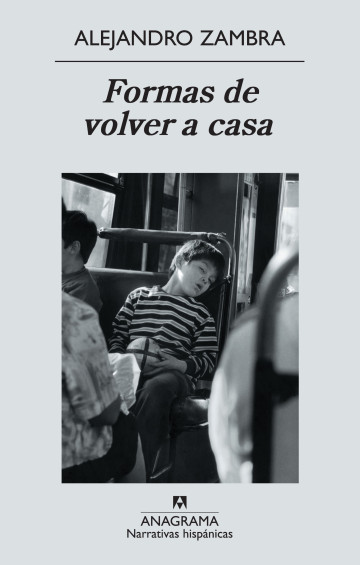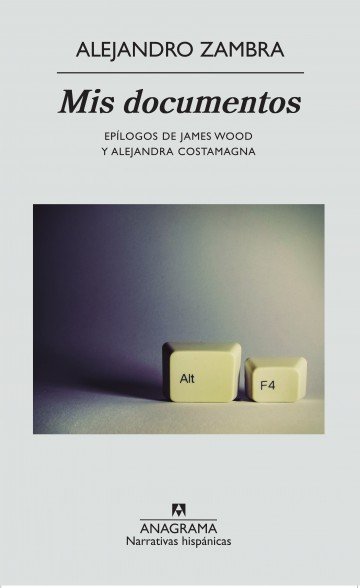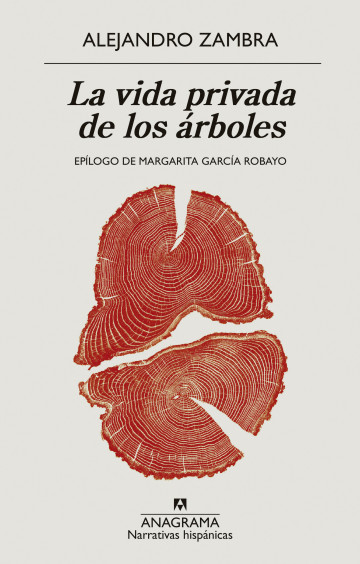| PAGES | 168 |
| SERIES | Narrativas hispánicas |
| PUBLICATION | 08/04/2011 |
New York Times
Publishers Weekly
Revista de Letras
El Mundo
El Mundo
Telegraph
El País (entrevista de Leila Guerriero)
La Vanguardia
Las Últimas Noticias
Le Monde
Diario de Pontevedra
Revista El Sábado, Mercurio
World Literature Today
Canarias 7
El Ideal Gallego
The Observer
La Razón
Qué Leer, entrevista
Lire
El País
The New York Review of Books
La Tercera
Time Out
Words Without Borders
Quimera
El Correo
Notodolibros.com
El Mercurio
El Mundo, entrevista

SERIES:Narrativas hispánicas
Formas de volver a casa deals with the generation who, as the narrator makes clear, learnt to read and draw while their parents became accomplices or victims of the dictatorship of Augusto Pinochet. The long-awaited third novel by Alejandro Zambra shows Chile in the middle of the eighties through the eyes of a nine-year old boy.
The author points to the need for a literature of the children, a perspective that often contradicts the official version of events. But this book isn’t about killing the father, it is an effort to understand what really occurred during those dark years. Consequently, the novel strips away its own construction, through a diary in which the author registers all his doubts, his proposals and also, the worrying presence of a woman.
With precision and melancholy, Alejandro Zambra reflects on Chile’s past and present.. Formas de volver a casa is the most personal novel by one of the best writers of the new wave of Chilean authors.
«With rage and melancholy, this important book investigates the crises affecting a country, a family and a defeated man who, despite everything, refuses to surrender to loneliness. Formas de volver a casa is a novel that suggests a formidable strategy to survive a daily existence that depends on the fragility of an individual utopia. An existence overshadowed by the consequences of a literature that forms a register of failures and, mainly, of resistance» (Patricia Espinosa, Las Últimas Noticias).
«The novel is a settling of scores in an age that was especially troubling in Chile: the 1980s. Inevitably, it is the parents who cannot avoid becoming part of this necessary search for justice. Sometimes, or more probably always, the simple act of returning home becomes the most difficult and painful task» (Juan Manuel Vial, La Tercera).
«Formas de volver a casa –perhaps as all good novels should – touches upon various genres, without belonging exclusively to any of them: it has shades of a political novel (as it deals with the historical circumstances in Chile after the military coup in 1973), but it is not a book about the dictatorship; there are two love stories, although it wouldn’t be correct to point to these as the main aspects of the book; it is also the story of the birth of a writer, of the difficulty of writing, of commitment and, at the same time, of a sense of discomfort with literature and the problem of being compelled to write it. The structure of the book is clear and solid and, above all, it is not the product of a literary ruse. Zambra transmits an authentic sincerity: he not only wants to tell a story, he wants to tell the story of the story: both are equally interesting to the author. Whether in the former or the latter, it is sensitive, perceptive, intelligent and attentive to significant details. At many points in the book, the reader feels, as the narrator himself says at one point to a friend: “This wasn’t invented, it really happened"» (Pedro Gandolfo, El Mercurio).
«The metafictional and autobiographical form of the novel brings to mind the best of Coetzee, with the distinctive resonance of Zambra’s best style, that—like Coetzee, but in a very different register—makes use of frugality, a term that connotes the book’s minimalism, its laconic accuracy» (Ignacio Echevarría, El Mercurio).
«A surprising and stimulating novel that deserves careful reading. A book that is both youthful and mature: an antidote against the superfluous, the skin-deep or the gratuitous and the excessive. Great literature for our times» (Luis Alonso Girgado, El Ideal Gallego).
«Zambra writes with subtlety and ability, using a style that seems to be derived from the school of Hemmingway and possessing sufficient skill to keep the attention of the reader» (Ricardo Senabre, El Cultural, El Mundo).
«Zambra uses a magnificent language in his novel, in the shadow of Carver: precise, melancholy, cruel and tender» (Joaquín Arnáiz, La Razón).
«The greatest virtue of this book is its creation of a narrative intensity (politically, sentimentally, intellectually and generationally) mixed with a reality that constantly challenges and surprises us» (J.A. Masoliver Ródenas, La Vanguardia).
«The Chilean poet has woven a novel with an admirable structure about a subject that is distinguished by its bravery, originality and commitment. I wish there were more books like this, because virtuosity means nothing without ideas. There’s no point to a literary loop the loop without a solid melody that obliges the reader to make an effort and lift his eyes towards a place beyond the page when he closes the book» (Jordi Corominas, Revista de Letras)
«Using the smallest details—childhood memories, the fantastical names of the streets that populate the author’s memory (or that of his character)—the novel goes towards the political and universal: Formas de volver a casa is a manifesto –in the best sense of the word—against wilful forgetting and mediocrity» (Carolina León, Notodolibros.com)
«The considerable literary skill of Alejandro Zambra means this novel transcends the subject of a Chilean family living in a certain historical moment, and becomes a universal story: few families can avoid those loud silences that create so much doubt and confusion among their children» (Cayetano Sánchez, Canarias 7).
«A notable writer, very perceptive about the diversity of styles» (Ricardo Piglia).
«Alejandro Zambra tells complex and seductive tales, without going over the top... His writing is contained and precise... The result is two short and sober novels, which have a calm beauty that can be returned to again and again». (Margarita Valencia, Arcadia).
«A fresh and complex literary voice that is difficult to pigeonhole» (Elvio Gandolfo, El País de Uruguay).
<«`A child asleep in the back seat of his parents’ car has a haunted dream that takes him from childhood into adulthood. The precocious boy is funny, romantic, a great observer and a deep thinker, not unlike the adult versions of himself who in Ways of Going Home revisits childhood mysteries in order to comprehend the present. Was it growing up during Pinochet’s corrosive and violent dictatorship that caused so much lasting damage and confusion, or was it family? Can creating a truer version of the past, however painful, through art, but also through love, allow the innocence and devotion of childhood to coexist with the knowingness and complex demands of adulthood? In Alejandro Zambra the poet and novelist are organically fused. Nearly every line startles in one way or another, always propelling the story forward towards a complete emotional journey. Ways of Going Home is compact, intimate, but also sweeping, and Zambra is amazing!» (Francisco Goldman).
«Alejandro Zambra belongs to that rare species of writer that bring language back to life. The strength of Ways of Going Home, its potency, is in the way it unfolds language in order to place its readers at that almost ungraspable intersection between individual and collective history». (Valeria Luiselli).
«I envy Alejandro the obvious sophistication and exquisite beauty of the pages you are about to read, a work which is filled with the heartfelt vulnerability of testimony. I loved it and I read it with the great joy of anticipation that one has reading a writer one hopes to read more and more of in the future». (Edwidge Danticat, National Book Critics Circle Award-winning author of Brother, I'm Dying).
«Alejandro Zambra is one of the writers of my generation that I most admire. Never a wasted word. Never a false note. His is an utterly unique voice, one I go back to again and again». (Daniel Alarcón).
«Complex yet sophisticated, the novel places Zambra at the spearhead of a new Chilean fiction and sets him alongside other Latin American writers such as Colombia's Juan Gabriel Vásquez, who weave some of the continent's most difficult historical themes into an exciting modern art form» (Mina Holland, The Observer).
«Zambra raises thoughtful questions about expectations for and the limitations of the redemptive possibilities of art. Unfortunately, the conclusion feels like a shortcut, less satisfying than the observations of either the boy or the man creating him. Overall, though, this compelling book brings the experiences of a generation to the page with haunting emotion and beautiful prose in a fine translation» (Publishers Weekly).
«The novel has an air of insomniac attentiveness: a sharpened observation of daily routine, an accumulation of detail and interleaving of banality and profundity. Megan McDowell’s limpid and unfussy translation serves the book well. Zambra cannot simply be pigeonholed as a "Spanish-Language" writer. His concerns and influences are broader» (Adam O'Riordan, The Telegraph).
«(T)he book is deceptively slight and finely wrought: it is both a wistful look at Chile's recent political history and a metafictional reflection on the nature of writing» (Matt Lewis, Times Literary Supplement).
«And the truth this light novel describes is heavy with anguish. For what is it to be born into this generation? “We go home,” Zambra writes, “and it’s as if we were returning from war, but from a war that isn’t over.” This is the giant, poignant condition staged by the novel’s playful doubleness — the way the best conjuring trick is the one where you’re shown how it’s done, which in no way contradicts your belief that what you’ve seen is magic» (Adam Thirlwell, New York Times).
| PAGES | 168 |
| SERIES | Narrativas hispánicas |
| PUBLICATION | 08/04/2011 |
New York Times
Publishers Weekly
Revista de Letras
El Mundo
El Mundo
Telegraph
El País (entrevista de Leila Guerriero)
La Vanguardia
Las Últimas Noticias
Le Monde
Diario de Pontevedra
Revista El Sábado, Mercurio
World Literature Today
Canarias 7
El Ideal Gallego
The Observer
La Razón
Qué Leer, entrevista
Lire
El País
The New York Review of Books
La Tercera
Time Out
Words Without Borders
Quimera
El Correo
Notodolibros.com
El Mercurio
El Mundo, entrevista
TRANSLATION RIGHTS SALES
- Italy (Mondadori)
- The Netherlands (Karaat)
- USA (Farrar, Straus & Giroux)
- France (Éditions de l´Olivier)
- Germany (Suhrkamp)
- UK (Granta)
- China (Shangai99)
- Turkey (Notos Kitap)
- Norway (Pax)
- Israel (Am Oved)
- Brazil (Planeta do Brasil)
- Serbia (Geopoetika)
- Portugal (Divina Comedia)
- Denmark (Skjødt Forlag)
- Sweden (Natur & Kultur)
- Iran (Cheshmeh Publication)
- Greece (Ikaros)


Alejandro Zambra (1975) is a Chilean writer. His novels have been translated into more than ten languages including English, French, Italian, Portuguese, Dutch, Chinese, Japanese and Turkish. His stories have appeared in literary magazines such as The New Yorker, The Paris Review, Zoetrope, Tin House, McSweeney’s, Vice, Letras Libres, Granta, The Virginia Quarterly Review, Quimera, Das Magazin, Tortuca and Piauí. His work has been featured in anthologies in Chile, Argentina, Peru, Colombia, Mexico, Holland, USA and Germany. He has worked as a literary columnist for several Chilean newspapers and magazines, including El Mercurio, La Tercera, Las Últimas Noticias, and The Clinic, as well as for newspapers in Spain, Argentina, Uruguay and Germany.
In 2013 Zambra received the Prince Claus Award in Holland for his oeuvre. He also received the 2013 English PEN Award for Ways of Going Home. In Chile he has twice received the National Council on Books and Reading prize for the best novel of the year (for Bonsai and Ways of Going Home). His novel Bonsai won the Chilean Critics prize, and Ways of Going Home won the Altazor prize. In 2007 he was chosen as one of the “Bogotá39,” the best contemporary Latin American writers under 39 years old, at the Bogotá Hay Festival. In 2010 he was chosen as one of the best Spanish-language writers under 35 by the magazine Granta. In 2011 Bonsai was adapted for the screen by the Chilean director Cristián Jiménez, and the film premiered in the section “Un Certain Regard” at the Cannes Film Festival.




